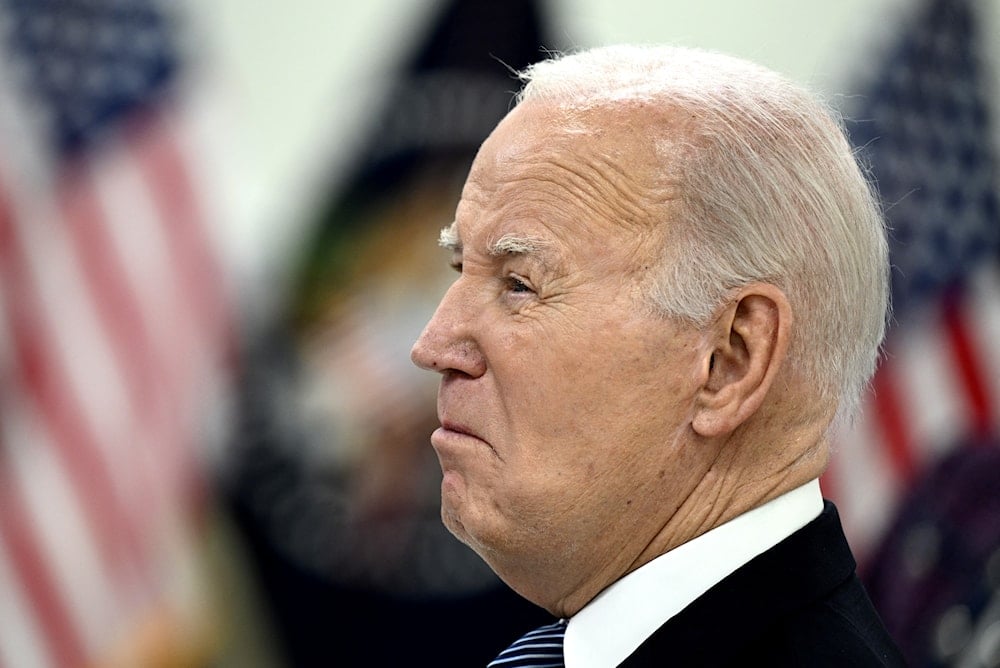Red Sea operations pose challenges for Biden's presidential campaign
A Bloomberg report explains how the Yemeni Armed Forces' operations in the Red Sea my impact US President Joe Biden's 2024 presidential campaign.
-

US President Joe Biden speaks about lowering prescription drug costs at the National Institutes of Health in Bethesda, Maryland, on December 14, 2023. (Photo by Brendan SMIALOWSKI / AFP)
Political unrest halfway across the globe looms as a potential factor impacting US internal affairs, particularly as the 2024 presidential race intensifies, Bloomberg reported on Monday.
The Yemeni Armed Forces' operations in support of the Palestinian people in Gaza have led to a halt in commercial shipping in the Red Sea, disrupting supply chains and potentially causing a sharp rise in prices for goods and oil, the news website mentioned.
It pointed out that this poses additional challenges for US President Joe Biden, who is already grappling with low approval ratings and public dissatisfaction over his economic management, noting that any sudden surge in energy costs could further complicate his reelection bid in November.
According to the report, there's a historical trend where fluctuations in gasoline prices tend to influence presidential approval ratings inversely. While this correlation doesn't imply causation, it strongly influences voter sentiment, it highlighted.
Bloomberg cited Gene Moran, a defense lobbyist and former US Navy captain, as saying that restoring stability to the Red Sea shipping routes may necessitate increased US military involvement.
Moran indicated that the current level of US involvement is more than desired and anticipates a heightened engagement.
Apart from the desire for affordable gas prices, polls suggest a united stance among US voters against deploying American troops abroad, the report emphasized.
This predicament, according to Bloomberg, leaves the Biden administration facing significant challenges without straightforward solutions, contributing an additional layer of uncertainty to an already unpredictable presidential campaign.
In a related context, a report by Newsweek highlighted that the Yemeni Armed Forces are capable of "harassing" more ships in the Red Sea than the US Navy can "protect".
As talks of surrounding a coalition, spearheaded by the United States, begin to materialize, concerns about the US' capacity to safeguard its own interests and those of the Israeli occupation are surfacing.
Operation Prosperity Guardian
In response to the Yemeni operations, under the guise of securing international maritime trade routes, the US military launched "Operation Prosperity Guardian" late on Monday.
The US Department of Defense announced that its "security initiative" will work under the umbrella of the Combined Maritime Forces and the leadership of its Task Force 153.
The United Kingdom, Bahrain, Canada, France, Italy, the Netherlands, Norway, Seychelles, and Spain, will be among the countries jointly working with the Pentagon to "address security challenges in the southern Red Sea and the Gulf of Aden, with the goal of ensuring freedom of navigation for all countries and bolstering regional security and prosperity," the US Secretary of Defense Lloyd Austin said.
According to the Associated Press, which cited an unnamed defense official, several other countries have also agreed to be involved in the operation, however, they prefer not to be named.
The United Kingdom, France, Spain, and the United States already have substantial naval presence in the region, with the US leading the coalition in terms of the number of and quality of deployed naval assets.
Read more: US-created anti-Yemen coalition to be filthiest in history: Sanaa

 3 Min Read
3 Min Read








